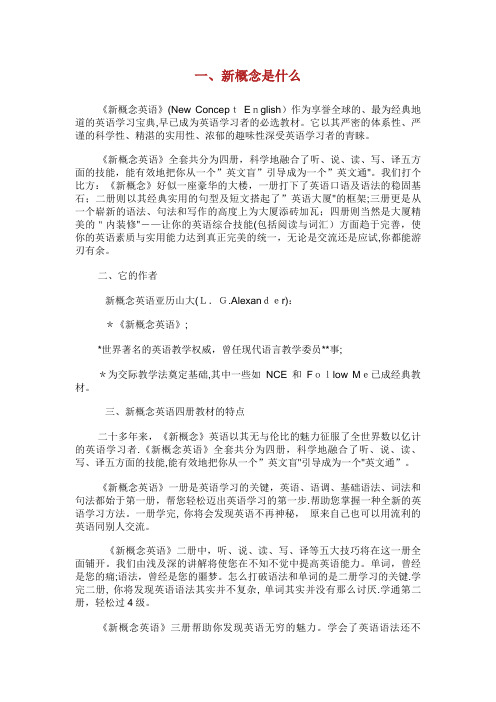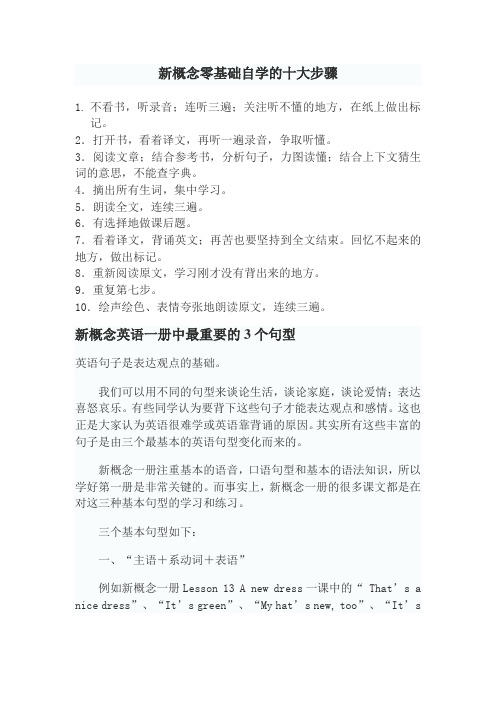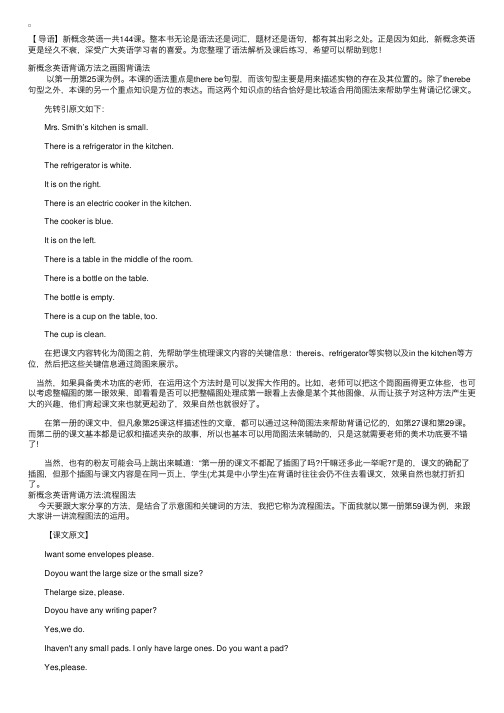自学新东方的《新概念英语》全攻略
新概念英语学习全攻略新概念英语

一、新概念是什么《新概念英语》(New ConceptEnglish)作为享誉全球的、最为经典地道的英语学习宝典,早已成为英语学习者的必选教材。
它以其严密的体系性、严谨的科学性、精湛的实用性、浓郁的趣味性深受英语学习者的青睐。
《新概念英语》全套共分为四册,科学地融合了听、说、读、写、译五方面的技能,能有效地把你从一个”英文盲”引导成为一个”英文通"。
我们打个比方:《新概念》好似一座豪华的大楼,一册打下了英语口语及语法的稳固基石;二册则以其经典实用的句型及短文搭起了”英语大厦"的框架;三册更是从一个崭新的语法、句法和写作的高度上为大厦添砖加瓦;四册则当然是大厦精美的"内装修"-—让你的英语综合技能(包括阅读与词汇)方面趋于完善,使你的英语素质与实用能力达到真正完美的统一,无论是交流还是应试,你都能游刃有余。
二、它的作者新概念英语亚历山大(L.G.Alexander):*《新概念英语》;*世界著名的英语教学权威,曾任现代语言教学委员**事;*为交际教学法奠定基础,其中一些如NCE和Follow Me已成经典教材。
三、新概念英语四册教材的特点二十多年来,《新概念》英语以其无与伦比的魅力征服了全世界数以亿计的英语学习者.《新概念英语》全套共分为四册,科学地融合了听、说、读、写、译五方面的技能,能有效地把你从一个”英文盲"引导成为一个"英文通”。
《新概念英语》一册是英语学习的关键,英语、语调、基础语法、词法和句法都始于第一册,帮您轻松迈出英语学习的第一步.帮助您掌握一种全新的英语学习方法。
一册学完, 你将会发现英语不再神秘,原来自己也可以用流利的英语同别人交流。
《新概念英语》二册中,听、说、读、写、译等五大技巧将在这一册全面铺开。
我们由浅及深的讲解将使您在不知不觉中提高英语能力。
单词,曾经是您的痛;语法,曾经是您的噩梦。
怎么打破语法和单词的是二册学习的关键.学完二册, 你将发现英语语法其实并不复杂, 单词其实并没有那么讨厌.学通第二册,轻松过4级。
新概念零基础自学的十大步骤

新概念零基础自学的十大步骤1.不看书,听录音;连听三遍;关注听不懂的地方,在纸上做出标记。
2.打开书,看着译文,再听一遍录音,争取听懂。
3.阅读文章;结合参考书,分析句子,力图读懂;结合上下文猜生词的意思,不能查字典。
4.摘出所有生词,集中学习。
5.朗读全文,连续三遍。
6.有选择地做课后题。
7.看着译文,背诵英文;再苦也要坚持到全文结束。
回忆不起来的地方,做出标记。
8.重新阅读原文,学习刚才没有背出来的地方。
9.重复第七步。
10.绘声绘色、表情夸张地朗读原文,连续三遍。
新概念英语一册中最重要的3个句型英语句子是表达观点的基础。
我们可以用不同的句型来谈论生活,谈论家庭,谈论爱情;表达喜怒哀乐。
有些同学认为要背下这些句子才能表达观点和感情。
这也正是大家认为英语很难学或英语靠背诵的原因。
其实所有这些丰富的句子是由三个最基本的英语句型变化而来的。
新概念一册注重基本的语音,口语句型和基本的语法知识,所以学好第一册是非常关键的。
而事实上,新概念一册的很多课文都是在对这三种基本句型的学习和练习。
三个基本句型如下:一、“主语+系动词+表语”例如新概念一册Lesson 13 A new dress一课中的“ That’s a nice dress”、“It’s green”、“My hat’s new, too”、“It’sthe same colour”、“That is a lovely hat!”等都是在练习这个基本句型。
在这一句型中:1. 主语是句子的主体。
名词和代词可以做主语。
2. 系动词用于连接主语和表语。
使用最多的是Be 动词(am, is, are)。
3. 表语表示主语的身份、状态以及所处的位置。
名词,形容词,介词短语可以作表语。
在这一课中:“That’s a nice dress. ”是使用的代词做主语,名词作表语。
“ It’s very smart.” 是使用的代词做主语,形容词作表语。
“My hat’s new.” 是使用的名词做主语,形容词作表语。
新东方老师写的新概念英语学习方法,

刚看到一篇新东方老师写的新概念英语学习方法,供参考我觉得如果是一点英语基础也没有的人,那就按部就班的从第一册学到第四册。
但是有过一定的英语基础的人,应该怎样计划自己的学习呢?有的人从第二册开始学,有的人从第三册开始学,这样好不好呢?既然新概念是一个基础教育的教材,那就应该把基础打好。
我在北京的日子,把新概念一路学下来,觉得对于一个有一些英语基础的人,应该这样学新概念:如果你的基础不太好打算从第二册开始学新概念,那么你先搞到一套东田的新概念第一册的讲座视频,也就是外研社拍的那套,仔细的看一遍,同时买一套新东方的新概念网络课堂光盘版。
同步的看第一册。
把第一册的基础打好。
然后,报新概念4册的班,新东方的,戴尔的,环球雅思的,都可以,只要这个学校能讲新概念四册,老师的实力就一定不错。
为什么要先学第四册?因为新概念只有第四册是原汁原味的英语。
而且你已经有了一定的基础。
如果你从第二册学起,再学第三册,那么总是觉得有难度在里面,可能班上完了,学到的东西不能很好的消化,可能只能掌握60%不到。
而这时候,往往大多数人学完第三册就不继续学了,因为感觉第三册已经很不好消化理解了。
准备回去好好复习一下,结果别的杂事一多,慢慢的就放下了英语的学习。
而先学第四册虽然一开始有些吃力,但是只要你咬牙坚持两个星期,你就会慢慢的跟上老师你的进度,你会发现自己的提高很快,很有成就感。
而且学习到的是纯正的英语。
同时回家辅助于外研社的视频做预习和新东方的网络课堂做复习。
当第四册学完以后,你会有或然开朗的感觉,你会真正的体会到英语是什么。
然后你再报第三册的班,这时候,你就不会觉得第三册很难了。
而且课堂上老师所讲的,一般你能消化吸收80%甚至更多。
如果你配合外研社视频和新东方网络课堂学习新概念第三册很有效果的话,你可以考虑在学习完第三册以后,不报第二册的班,直接使用外研社的视频和网络课堂自学第二册。
如果觉得吃力,那就再报第二册的班,继续这样的学习。
新概念英语入门级教程

新概念英语入门级教程
新概念英语入门级教程主要包括以下内容:
1. 学习基本的英语语音、语调,打好语音基础。
2. 学习基本的英语语法和句型,掌握常用词汇和表达方式。
3. 通过模仿、背诵、练习等方式,逐步提高听、说、读、写能力。
4. 培养学习英语的兴趣和自信心,为进一步学习英语打下基础。
具体来说,新概念英语入门级教程包括以下几个部分:
1. 语音部分:学习基本的英语语音发音规则,包括元音、辅音、连读、语调等方面的内容。
2. 词汇部分:学习常用的基础词汇,包括名词、动词、形容词、副词等各类词性,以及常用的短语和表达方式。
3. 语法部分:学习基本的英语语法规则,包括名词的复数形式、动词的时态、冠词的用法等,以及句子的基本结构。
4. 练习部分:通过各种练习,如模仿跟读、听写、选择题等,巩固所学知识,提高听、说、读、写能力。
5. 故事部分:通过学习新概念英语入门级教程中的故事,了解英语的基本文化背景和语言表达方式。
总的来说,新概念英语入门级教程是学习英语的基础,通过系统地学习这套教程,可以建立起基本的英语基础知识和语言表达能力,为进一步学习英语打下基础。
1分钟Get新概念英语高效学习方法

【导语】新概念英语⼀共144课。
整本书⽆论是语法还是词汇,题材还是语句,都有其出彩之处。
正是因为如此,新概念英语更是经久不衰,深受⼴⼤英语学习者的喜爱。
为您整理了语法解析及课后练习,希望可以帮助到您!新概念英语背诵⽅法之画图背诵法 以第⼀册第25课为例。
本课的语法重点是there be句型,⽽该句型主要是⽤来描述实物的存在及其位置的。
除了therebe 句型之外,本课的另⼀个重点知识是⽅位的表达。
⽽这两个知识点的结合恰好是⽐较适合⽤简图法来帮助学⽣背诵记忆课⽂。
先转引原⽂如下: Mrs. Smith’s kitchen is small. There is a refrigerator in the kitchen. The refrigerator is white. It is on the right. There is an electric cooker in the kitchen. The cooker is blue. It is on the left. There is a table in the middle of the room. There is a bottle on the table. The bottle is empty. There is a cup on the table, too. The cup is clean. 在把课⽂内容转化为简图之前,先帮助学⽣梳理课⽂内容的关键信息:thereis、refrigerator等实物以及in the kitchen等⽅位,然后把这些关键信息通过简图来展⽰。
当然,如果具备美术功底的⽼师,在运⽤这个⽅法时是可以发挥⼤作⽤的。
⽐如,⽼师可以把这个简图画得更⽴体些,也可以考虑整幅图的第⼀眼效果,即看看是否可以把整幅图处理成第⼀眼看上去像是某个其他图像,从⽽让孩⼦对这种⽅法产⽣更⼤的兴趣,他们背起课⽂来也就更起劲了,效果⾃然也就很好了。
2024年新概念英语自学计划表(5篇)

2024年新概念英语自学方案表(5篇)新概念英语自学方案表篇一听力要求1.认真做好课堂笔记,是系统复习的重要材料;2.每篇课文的课后练习都需要严格按照要求完成,保证听力效果;3.尽可能花时间制作匹配的练习册,稳固所学知识。
第一周1.新概念英语第一册有857个单词,检查词汇是否符合要求。
假设你已经到达要求,你可以直接去上课的第二卷。
否那么需要安排1周背诵词汇(结合背诵四级词汇)并做好上课前的准备。
2.根据课本给出的试题,做一个自我测试,理解自己的听、说、读、写才能:(1)整体才能是否到达学习要求;(2)意识到四种才能的优缺点,在学习过程中加大对弱点的训练。
第2-19周听力要求1.课前准备要求可以背诵下一课的生词,复习上一课的单词;结合课堂上的语法要求和【【关键词】:^p 】:组,可以复述文章大意;2.根据录音读课文,每天坚持至少一小时;3.完成教材要求的课后练习,并及时向教师汇报解决方案;4.完成教师要求的背诵,根据磁带听写课文内容;5.掌握教师教的根本语法和词汇短语的用法;6.课堂上踊跃发言,让教师有时机纠正你的错误,这将有助于进步你的英语口语。
评论1.25班和55班学习完成后,建议安排阶段复习;2.所有课时完毕后,安排时间进展总复习,根据课堂笔记复习重点内容;3.课本第四单元的新单词和语法在前面的课程中已经通过同义词、近义和相似联想的教学进展理解释。
据统计,新概念教材第二册词汇量为1126个,而课堂实际所需词汇量已到达3000个;4.第二册学生要在40节课后理解纯英语教学,可以写简单的字母,听说读写才能显著进步;5.完成新概念英语第二册学习内容的学生,可以通过有针对性的考试技能训练,参加四级考试。
新概念英语第二册是学习英语的根底部分。
全书共96课,每篇课文由150字左右的短篇故事组成。
这篇课文讲故事,容易学。
每篇课文都有不同的侧重点和语法知识点,但整篇课文在语法知识上是连接的、全面的,形成了一个独特的、有新概念的英语语法体系。
新概念英语学习方法
新概念英语学习方法篇一:三个月背108篇新概念英语学习方法经验谈三个月背108篇新概念英语学习方法经验谈每个人都会根据自己的学习特点采取不同的学习方式,下面给大家推荐几种不同的背诵方法。
方法(一)(1)明确目的,集中精力背诵一篇课文或者一段必须掌握的语句,最忌东张西望,漫不经心,注意力分散。
如果是一篇很简单的文字,背了几天后仍老出错,这肯定是用心不专的缘故。
至于出现“前记后忘”的现象,则是正常的,这时千万不要向这种暂时困难屈服而打退堂鼓。
(2)确定任务,寻找窍门背诵一篇短文,仅仅读几遍是行不通的,一定要熟读到滚瓜烂熟的程度才行。
开始时可短一些,容易一些,然后作一定幅度的调整。
此外,背诵时还要讲究一定的技巧,熟读课文内容,理解课文大意,不仅不会记错和混淆,而且记住的数量也会越来越多。
(3)坚持复背,及时检查复习背诵的时间用得越多,记住的效果就越佳。
例如,早晨背诵过的课文或知识,晚上睡前以及第二天起床后,应进行一次复背,并在每周六或周日再作适当的温习背诵,以后过一个月再复背一次。
这样,可保证很长一段时期不会遗忘。
(4)加强默写,强化训练所谓“眼过千遍,不如手抄一遍”。
采取默写手段,可有效地巩固已经背诵了的课文和知识,而且对加深记忆大有好处。
因为文字本身就是一种图形和符号,经常默写可帮助我们促进右脑的开发。
如果能切实做到循序渐进,长期进行默写训练,那么一定会有助于背诵的质量和效果。
方法(二)(1)反复阅读与再现相结合单纯地反复阅读效果并不好,学习者应该在文章还没有完全记住前积极进行尝试再现,回忆不起来时再阅读。
这样容易记住,而且保持时间也长。
特别生疏的语句,注意多尝试再现几次。
因为尝试再现是一种比阅读更积极的智力活动,又是一种自我检查的过程,使人更能集中精力,掌握识记内容的重点、难点,并及时改正记忆中的错误。
(2)试背背诵过程中,如果出现“卡壳”,应该进行追忆。
追忆是有意和间接再现的形式,它需要付出很大的意志力,克服一定的困难,多方面寻找线索,进行积极灵活的思维。
新概念英语第三册如何学习
新概念英语第三册如何学习在学习新概念英语三之前,一定要做的一件事,就是打好语法基础,不学语法,新三根本学不下去。
下面店铺为你整理了新概念英语第三册学习方法,希望对你有帮助。
新概念英语第三册学习方法一.明确目的,集中精力背诵一篇课文或者一段必须掌握的语句,最忌东张西望,漫不经心,注意力分散。
如果是一篇很简单的文字,背了几天后仍老出错,这肯定是用心不专的缘故。
至于出现“前记后忘”的现象,则是正常的,这时千万不要向这种暂时困难屈服而打退堂鼓。
二.反复阅读与再现相结合背诵一篇短文,仅仅读几遍是行不通的,一定要熟读到滚瓜烂熟的程度才行。
单纯地反复阅读效果并不好,学习者应该在文章还没有完全记住前积极进行尝试再现,回忆不起来时再阅读。
这样容易记住,保持时间也长。
特别生疏的语句,注意多尝试再现几次。
因为尝试再现是一种比阅读更积极的智力活动,又是一种自我检查的过程,使人更能集中精力,掌握识记内容的重点、难点,并及时改正记忆中的错误。
开始时可短一些,容易一些,然后作一定幅度的调整。
三.加强默写,强化训练所谓“眼过千遍,不如手抄一遍”。
这也是运用内部语言背诵的一种形式,既用脑,又动手,可加深对文章的记忆。
因为文字本身就是一种图形和符号,经常默写可帮助我们促进右脑的开发。
采取默写手段,可有效地巩固已经背诵了的课文和知识,而且对加深记忆大有好处。
一篇文章,就这样一段一段地把它“吃掉”。
最后,遵循“整体→部分→整体”的原则,按照背诵各段的方法,再把全篇串联起来,进行背诵。
如果能切实做到循序渐进,长期进行默写训练,那么一定会有助于背诵的质量和效果。
新概念英语3学习方法(1)反复阅读与再现相结合单纯地反复阅读效果并不好,学习者应该在文章还没有完全记住前积极进行尝试再现,回忆不起来时再阅读。
这样容易记住,而且保持时间也长。
特别生疏的语句,注意多尝试再现几次。
因为尝试再现是一种比阅读更积极的智力活动,又是一种自我检查的过程,使人更能集中精力,掌握识记内容的重点、难点,并及时改正记忆中的错误。
新概念英语第一册自学手册:第一课笔记(新东方版)
本课重点句型:Is this your...? Lesson 1 Excuse me! [词汇] Excuse v. 原谅 me pron. 我(宾格) yes adv. 是的 is v. be动词现在时第三⼈称单数 this pron. 这 your possessive adjective 你的,你们的 handbag n.(⼥⽤)⼿提包 pardon int. 原谅,请再说⼀遍 it pron. 它 thank you 感谢你(们) very much ⾮常地 Excuse me ⽤法: 1、向陌⽣⼈问路时 2、引起对⽅注意时 3、在某个聚会中突然中途要离开⼀会⼉时 4、在发⽣⼀个简单的不算太错的错误时 sorry 对不起,⽤于对别⼈有伤害时 ⼈称代词主格宾格形容词性物主代词名词性物主代词 我(们)Imemymine 你(们)youyouyouryours 他(们)hehimhishis 她(们)sheherherhers 主格⼀般作主语,放在句⾸ 宾格作宾语,放在动词或者介词之后 形容词性的物主代词不能单独使⽤,后⾯必须跟名词或者其他的词 名词性的物主代词是单独使⽤的 This is my pen. 这是我的钢笔。
This pen is mine. 这只笔是我的。
yes读降调表⽰对某件事情的认同,读升调表⽰询问 v. verb 动词 adj. adjective 形容词 adv. adverb 副词 pron. pronoun 代词 prep. preposition 介词 n. noun 名词 conj. conjunction 连词 be 动词有 am, is, are am 只能跟在第⼀⼈称的单数 I 后⾯ is 跟在第三⼈称单数 he, she 后⾯ be 动词的基本意思:是 she is, he is, it is, Tim is are 搭配 you, 不管是单数还是复数 you are, we are, they are I am = I'm she is = she's he is = he's it is = it's Tim is = Tim's you are = you're we are = we're they are = they're 含有 be 动词的简单的陈述句,否定句,⼀般疑问句。
新概念英语之学习法大全(20201015022933)
新概念英语之学习法大全一.激情(passio n):英语学习中唯一理性的动力。
1. 学习语言需要激情。
人生需要激情。
成功需要激情。
自信来自激情。
2. 激情造就天才3. 运用激情的方式二.激情联想学习法在英语学习中的运用。
1. 用激情联想征服词汇。
词汇-英语之根;秘招-联想扩展-至高境界词形联想法:I词缀词根联想:说起来容易做起来难,若一旦掌握受益终生。
/懒惰者勿用。
/扩大高难词汇必用之秘方。
pos-put:\"放\" expose (ex<夕卜面>expose 放在外面—暴露);impose (im<里面〉—强加);depose(••…)必须掌握的词缀及词根I content contend consent bear dear fear gear hear n ear pear rear tear wear yearl 同族词联想:大量单词一脉相通女口:f orget^forgetful f forgetfully f forgetfulnesAforgettable^forgetter —un forgettable 等。
词义联想法l 同义词与反义词联想:新概念二、三册单词联想示例初级联想:big f large f huge f great f grand f高级联想:colossal (庞大的)船-泰坦尼克号f titanic f gigantic fimmense f vast f enormous f tremendouswild [waild> a. 野生的,野性的(living in a natural state, not controlled by humans)[联想> f (同)feral(a.凶猛的);barbarous(a野蛮的)(反)tame (a驯服的);domestic(a家养的)[经典用法>wild wind 强风,wild guess瞎猜,wild times乱世经典用法联想二册词汇用法联想示例:seat [si:t> n.座位;vt.使座下(a place to sit ; to let somebody sit down.) [经典用法联想> —①have a seat/take a sea就座T② be seated/seat on eself/下这里seat 是及物动词,联想—enjoy oneself 玩得开心:dress on eself 给 .. 穿衣[习惯搭配联想/超级联结联想/经典词汇联想/语法功能联想> 拟声联想法:\"P\"T拍打,撞击等声音。
- 1、下载文档前请自行甄别文档内容的完整性,平台不提供额外的编辑、内容补充、找答案等附加服务。
- 2、"仅部分预览"的文档,不可在线预览部分如存在完整性等问题,可反馈申请退款(可完整预览的文档不适用该条件!)。
- 3、如文档侵犯您的权益,请联系客服反馈,我们会尽快为您处理(人工客服工作时间:9:00-18:30)。
自学新东方的《新概念英语》全攻略
去年下半年我教了一个学期的计算机专业英语,可能很多学生喜欢我的英语课,所以常常来问我关于英语学习的问题,我结合自己的经验总结了一下,写出来与大家共享,很多东西还不是很成熟,我知道高人很多,为了那些喜欢学习英语的学生,希望大家不吝赐教,以便让我进一步归纳总结,谢谢!
学习准备工作
1、买一个MP3,最好录音效果比较好的那种
2、买一台电脑
3、买一套《新概念英语》教材(共四册),还有配套的《自学导读》、《练习详解》
4、准备一套新东方的《新概念英语》FLASH视频教程,这个可以下载,市场上好像也有啊
5、下载一套配套的新东方的《新概念英语》FLASH视频教程笔记和新东方补充资料,打印出来装订成册,可以随时翻阅
学习过程
(高中毕业的可以从第二册开始学习)
1、制定一个计划,例如每周学习一课。
严格按照计划进行。
2、先预习课文。
划出你不认识的单词,还有你不熟悉的句型,这些单词和句子一般在课文讲解的时候会重点讲解。
3、在电脑上看该课文的FLASH视频教程,对着笔记学习,必要时补充笔记。
重点特别要注意你在步骤2划出的单词句型。
4、背诵课文。
a) 没事的时候就用MP3听该课的录音,走路坐车吃饭跑步等等都可以,这些时候并不在于你能听多少,主要是给你听力刺激!
b) 每天早上和睡觉之前花半个小时集中精力背课文,早上最好自己大声朗诵,多花一点时间。
c) 自己可以流利背诵了以后,可以将自己背诵的用MP3录下来,然后放给自己听,对比自己的发音和课文MP3的录音区别。
d) 课文一定要背到乱熟,可以脱口而出!
5、复习讲课的内容。
复习的时候可以将FLASH视频教程的语音提取出来(提取出来的是MP3格式),放在MP3里面边听边复习。
6、最后做做练习吧。
7、一课学习结束了以后,接着下一课的学习,在学习下一课的时候,抽空回头复习一下前面的课文,如此循环。
8、关于单词。
a) 要是课文你达到乱熟的程度,那么单词你肯定已经记住了。
单词学习的关键注意词意辨析。
b) 专门学习单词的时候,上网下载新东方名师刘畅古典的笔记、网络课堂赵丽的笔记和课堂录音
9、关于语法。
a) 上网下载新东方名师《白易礼英语语法.(30.25全)(最终珍藏版)》。
